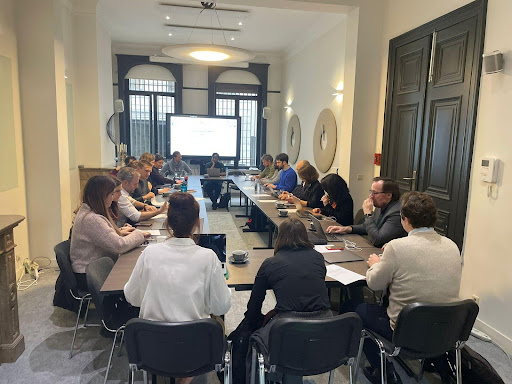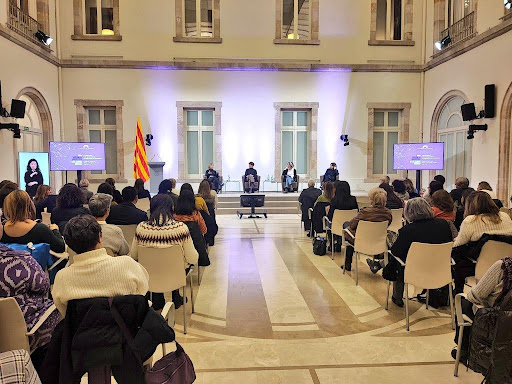Elections & Democracy, European Policy, Free Expression
EU Tech Policy Brief: February 2024
This is the February 2024 issue of the Centre for Democracy & Technology Europe‘s monthly Tech Policy Brief. It highlights some of the most pressing technology and internet policy issues under debate in Europe, the U.S., and internationally, and gives CDT’s perspective on them. Our aim is to help shape policies that advance our rights in a digital world. Please do not hesitate to contact our team in Brussels: Iverna McGowan, Asha Allen, Silvia Lorenzo Perez, Laura Lazaro Cabrera, and Rachele Ceraulo.
CDT Europe Starts 2024 with Newly Boosted Team
CDT Europe has begun 2024 with a significant boost to its team in Brussels, with two new appointments. Laura Lazaro Cabrera has joined the team as Counsel and Director of the Data and Equity Progamme, and Silvia Lorenzo Perez is newly appointed Director of the Security, Surveillance and Human Rights Programme. Both positions are new for the organisation.
“We are delighted to welcome these two new talented advocates to join our growing team,” said Iverna McGowan, Director of CDT Europe. “2024 brings significant challenges in the tech policy space, with many big pieces of legislation coming into force and the EU elections just around the corner — making the work that we do to promote democracy and human rights in the EU’s digital sphere more important than ever. We’re delighted to welcome Laura and Silvia, whose extensive experience will help us to hold policymakers to account, whilst strengthening our important work with civil society partners.”
The team is further boosted by our new EU Advocacy intern, David Klotsonis. In the last 5 years, David has focused both his academic and professional career on EU digital policy, from disinformation to transatlantic digital cooperation, to AI policy to the DSA.
The Digital Services Act Civil Society Coordination Group Meets in Brussels

2024 is going to be the real test for the EU’s Digital Services Act (DSA), which comes into full force for all intermediaries and online platforms on February 17, 2024. CDT Europe, along with our civil society partners, is therefore sharply focused on this first period of the DSA’s implementation and enforcement and, more concretely, how civil society will be engaged throughout.
On 29th January in Brussels, CDT Europe brought together more than 22 civil society organisations for the first in-person meeting of its DSA Civil Society Coordination Group. Also attending were representatives from EU Member State regulatory authorities, who will oversee DSA enforcement at national level, alongside representatives from the European Centre for Algorithmic Transparency, who are tasked with enforcing the Regulation for the largest online platforms and search engines. We hope that establishing a strong partnership with these key stakeholders will strengthen civil society’s role in enforcing the DSA.
Bringing together and coordinating joint action by civil society is vital, given the need to respond to the DSA enforcement actions already under way by the European Commission. In October 2023, for example, civil society sent a joint letter urging European Commissioner Thierry Breton to respect procedural safeguards when enforcing the DSA. The Group will continue to closely monitor how the Commission carries out its implementation and enforcement of the DSA.
CDT Europe Responds to European Commission Public Consultation on Templates for Transparency Reports Under EU Digital Services Act
Increased transparency is essential to developing a better understanding of the societal impacts of online platforms. The EU Digital Services Act lays down rules for mandatory transparency reports on the content moderation engaged in by all providers of intermediary services and online platforms operating in Europe. In January, CDT responded to a public consultation opened by the Commission on Templates for Transparency Reports Under the DSA, providing recommendations on how to make transparency reports more effective.
By collecting more precise and tangible data points, alongside more qualitative information, the templates will set a higher bar for real, meaningful transparency from service providers. To prevent transparency reports from failing to capture vital information in the public interest, CDT Europe specifically recommended that the Commission clarify how the templates are structured, and improve the categorisation and data points requested in the reporting templates.
We further recommended stronger alignment between the quantitative and qualitative data requested in the reporting templates, as both elements are essential to developing a more in-depth understanding of how user-generated content is being moderated. Lastly, we urged the Commission to provide additional guidance on some of the terms used and scope for service providers to supplement the data provided with information on how they internally understand and apply certain terms such as ‘content moderation’.
Gender-Based Violence on Social Networks: CDT Europe at the Catalonian Parliament

On 11th January, gender-based violence (GBV) on social networks was on the agenda at Catalonia’s Parliament, as part of a series of expert talks. Asha Allen, CDT Europe’s Director for Online Expression & Civic Space, joined other experts and human rights advocates to address Members of Parliament.
Asha highlighted that women of colour are at increased risk of experiencing online GBV, with trans and non-binary persons also being subject to high levels of GBV both online and offline. Asha warned that online GBV threatens efforts to make democracy more equitable, and also chills the speech of future political leaders and champions, as more young women are effectively being silenced online due to the high level of online harassment they face.
Focusing on legislative developments in her presentation, Asha outlined that there’s much that can be done at EU level: the EU’s Directive on Violence against Women and Domestic Violence is a welcome step forward, but Europe still lacks a holistic framework to tackle gender-based violence and, in particular, mechanisms to address online gender-based violence. Asha pointed out the importance of recognising that not all forms of online gender-based violence should be criminalised. Online harms must be comprehensively addressed, but hastily criminalisation may unintentionally cause harm through over-enforcement of the laws, as is often the experience of historically marginalised groups. It therefore may undermine the rights of the very groups that should be protected, by providing legal avenues through which their free expression may be further suppressed.
Finally, Asha called for the Directive to be aligned with the DSA, which is already in force; and, the measures that are going to be the most impactful for combatting online GBV are already being implemented.
CDT Europe Recruiting New Europe Director & Secretary General
CDT Europe is on the search for its new Europe Director & Secretary General. Please share our call for an experienced, values-driven Director to lead our work ensuring that human rights are at the core of European digital policy, practices, and laws.
The position offers an exciting opportunity to lead an incredible, growing team of programme directors and staff focused on wide-ranging issues including user privacy, AI, government surveillance, and online expression and civic space.
The position is based in CDT’s Europe Office in Brussels. Find out more, apply, and share widely with your networks.

